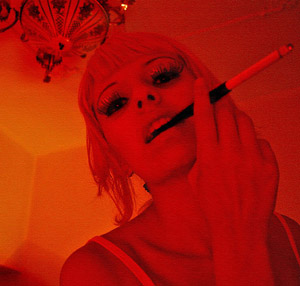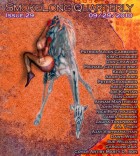From the moment I read the first paragraph of “Our Littlest Brother,” I was in that scene. The language is the rough-and-tumble voice of breathless excited boys on an adventure, a voice perfectly suited to the situation you’re writing about. Where does it come from?
As I’ve told students in workshops, start with what you know and then start lying. I grew up surrounded by three brothers and so I started with those summer days when we were outside from early morning until the street lights came on.
The lying came with all of the exaggerations, the over-the-top menace. Though, I guess, I wasn’t too far off with some of what these characters do (my brothers and I broke many bones during our many adventures around the neighborhood) which I hope added to the believability of the situations. I’m glad you saw that the voice matched the actions of these many “we” and even though setting really isn’t emphasized, I tried to make the world of a 1970s suburb ring true.
Your childhood experiences in the 70s have a universal quality to them in this story; that is, of course, one of the many appeals of this piece. These boys could live in Dickens’ world as well as William Golding’s. What do you tell your workshop students about “the universal” in stories? Oh and while you’re at it, could you tell us more about the workshops? I guess that’s two questions. Please expound!
I think writing universally is about reaching as many readers as possible. Again, if a writer starts with something that is true, it is amazing how many readers have also experienced that same true moment. A reader, because of these moments, has this strong connection with the story, and, as I’ve said to students, the more connections that are made, the longer the story may stick around out there. I’ve taught quite a lot of workshops at different community colleges and universities and was a full-time Lecturer for a time.
I’m an idea guy. And I guide my students to come up with as many different choices their characters may take, to be open for the story to travel into unexpected places. Because my teaching load is much lighter these day (thanks economy!), I’ve been able, for the first time in years, to work on my own writing, cranking out new work, revising old stuff, submitting more than ever. But I’m grateful for all of the workshops (going on over 40 now); assisting others has given me better skills to assist myself.
Though I don’t agree that every writer needs to go through the same kind of apprenticeship (i.e., only after writing and revising a dozen stories he/she is ready to now really write), I do think teaching writing has been my own kind of apprenticeship in a way. Oh, and it’s wild you mention Golding. His novel was a huge influence in this story!
I love what you say about connections, “the more connections that are made, the longer the story may stick around out there.” So true. Now I’m wondering about your process. How you go about getting your stories from start to finish. How do ideas come to you? How do you go about developing those ideas? Do you complete a first draft, make notes, outline? How much revision do you usually do?
I do a lot of revisions, maybe too many, if there is such a thing. I mean, is a story really ever finished? I do make notes. I was out walking yesterday and thought of a scene for a story I’m working on now, and repeated the scene over and over again in my head, changing details here and there, until I got home and wrote a whole page worth of notes.
Some stories come from what I overhear. Sometimes I get an image. One story I published in the North American Review started out as this image of a small room filled with all these candles, then I populated the room with some characters and I was off and running.
A character’s “want” is very important to me. If I don’t know what a character wants then I usually stay stuck. But mostly my process is thinking a story to death, thinking I know where I’m going, and then in revisions everything changes. I know the ending of every story I’ve ever written, but the ending always is different after revisions. I’m not one of those writers who starts writing without having a vague idea of what might happen scenes ahead. I guess it’s a crutch of sorts, but a comfortable crutch with thick foam padding.
Thanks for sharing how you work. Now, we’re almost done here, but since you mentioned William Golding as having been an influence on “The Littlest Brother,” I’m interested in other books or stories that have inspired your writing.
I’m just finishing up on Elaine Ford’s story collection The American Wife—I really like her ease on the page. I’m also a fan of Chekhov, Carver, Tobias Wolff, Richard Yates, Salinger, Mary Robison, Bernard MacLaverty, Nathanael West (Miss Lonelyhearts, I think, is perfect). Oh, lately I keep going back to a story collection by Charles Dickinson called With or Without. He is amazing. Every story has multiple connections with me like we were talking about earlier.
What’s next on Dan Crawley’s agenda?
At the moment, I’m finishing up a story collection, and a novella. I like the shorter stuff. I used to write songs, and a story, to me, is very much like writing a song.
I’m looking forward to reading more from you and since you teach, I’m curious as to what you’d like to say to your readers, those who read and those who read and write.
Just write. I know it’s cliché, and every writing teacher out there says it, but I’ve gone through bouts of not writing (for a few years, in the not-so-distance past). It was hell on earth. I lost all purpose. So if you get down a few lines a day, that’s a start.
In workshops, I start the class by playing two songs of varying lengths, at least ten minutes worth, and the students write during that time. They could write about the music, or whatever came into their heads. Just as long as they write something.



 The core workshop of SmokeLong Fitness is all in writing, so you can take part from anywhere at anytime. We are excited about creating a supportive, consistent and structured environment for flash writers to work on their craft in a community. We are thrilled and proud to say that our workshop participants have won, placed, or been listed in every major flash competition. Community works.
The core workshop of SmokeLong Fitness is all in writing, so you can take part from anywhere at anytime. We are excited about creating a supportive, consistent and structured environment for flash writers to work on their craft in a community. We are thrilled and proud to say that our workshop participants have won, placed, or been listed in every major flash competition. Community works.